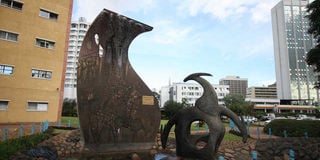
The fountain of knowledge at the University of Nairobi.
Times Higher Education has just released its latest ranking of universities and research institutions. Other agencies announced their rankings a little earlier in the year. The rankings are an annual affair that is usually highly anticipated by university administrators and other stakeholders in the higher education sector.
They help them to better understand how their institutions are perceived by learners and faculty relative to others, and also the emerging parameters that influence such perceptions and choices. This year's rankings have sent shockwaves through Kenya's education sector.
The University of Nairobi (UoN), once a beacon of academic excellence, has been systematically edged out of its dominant position by smaller institutions such as Embu, Kibabii, and Cooperative universities.
Kenyatta University too has been outperforming UoN on several metrics in recent years.
The most alarming aspect of this development isn't just the loss of UoN's prestige within Kenya; it's the institution's steep decline regionally and globally. Once a symbol of academic distinction within East Africa, UoN now struggles to maintain its reputation locally, regionally and on the world stage.
Times Higher Education rankings cover the main areas of university activity, namely: research quality and reputation; impact and visibility (citations), teaching (learning environment and teaching reputation); international outlook (staff and student diversity), and industry income (how businesses recognise and utilise the university and its research).
These parameters boil down to an institution's ability to fund quality research, and teaching and learning infrastructure, which in turn attracts international faculty and students. The result is enhanced research impact and global visibility.
UoN's global ranking was below 3,001 when Professor George Magoha became the first internationally-sourced Vice-Chancellor (VC) in 2005, and by the time he was exiting, the institution had moved impressively to between 601 and 800. Within Africa, the institution was ranked at position 13 in 2005, and seven in 2015.
In East Africa, UoN was ranked at position three, below Makerere and Dar-es-salaam in 2005, and in 2015, it regained its prestige as the best university in the region. Today, UoN is ranked below 1,501 globally, below 120 in Africa, and below 10 in East Africa.
The decline of UoN began immediately after the tenure of Prof Magoha, showcasing the impact of objective hiring and visionary leadership. Prof Magoha's appointment, the result of a merit-based process introduced by then President Mwai Kibaki, exemplified the benefits of academic autonomy and managerial adeptness.
Independent chancellors
Kibaki's reforms, which included the appointment of independent chancellors to public universities, ushered in a golden era of growth and innovation in Kenya's higher education. Unfortunately, with the exit of the Kibaki administration, cronyism returned to the institutions of higher learning. The appointment of successive university administrators became entangled with political interests. UoN is now better known for its leadership wrangles than academic excellence.
Magoha's achievements at UoN have since been reversed, and the giant institution has struggled to maintain its momentum. In addition, the UoN has abruptly terminated the services of many high-profile professors who were on post-retirement contracts. Once the professors left the institution, their eye-catching profiles were knocked off the university system, thus significantly reducing the institution's global visibility and impact.
Globally, prolific professors are gems, who are in great demand in leading institutions. It is not uncommon to find major world universities retaining old professors in their eighties and nineties to attract outstanding students and faculty for mentorship and shore up the institutions' global competitiveness. Unfortunately, some myopic university administrators in Kenya view professors only in terms of what it costs to maintain them on the payroll, and not what their presence means to those institutions in terms of global visibility.
The University of Nairobi is not just another institution; it is the very embodiment of higher education in Kenya. It is an integral part of Kenya's academic history. Established in 1956 as the Royal Technical College, affiliated with the University of London, the UoN has produced thousands of globally competitive graduates.
Its alumni and faculty include Nobel laureates, renowned intellectuals and international public servants such as Joseph Stiglitz, Paul Michael Todaro, Wangari Maathai, Odera Oruka, Okoth Ogendo, Okoth Okombo, Ngugi wa Thiong'o, Okot p'Bitek, Thomas Odhiambo, Taban Lo Lyong, Jandayi Fraizer, Richard Odingo, ES Atieno-Odhiambo, Bothwell Ogot, DPS Wasawo, DA Masolo and Joe Nyasani, among others. This institution has historically conferred massive respectability on Kenyan graduates, who have enjoyed international opportunities, courtesy of the university's stellar reputation.
Kenyan degrees
However, as UoN falters, the credibility of Kenyan degrees, whether from public or private institutions, may be on the line. In Kenya, public universities like UoN have traditionally benefitted from student allocations by the Kenya Universities and Colleges Central Placement Service (KUCCPS). This system guarantees enrollment, without these institutions needing to compete for students. For decades, UoN and a handful of other public institutions thrived in this setup, admitting large numbers of students, often at the expense of quality education. The ground is, however, now fast shifting.
Today's labour market demands graduates with practical skills and measurable contributions to the firm's scorecard, not just degrees. Students and their sponsors are increasingly discerning, seeking institutions that guarantee smaller class sizes, specialised attention and better facilities.
This shift has exposed UoN's lack of a competitive edge in teaching and learning infrastructure and governance. Once shielded by its reputation, the university now faces immense scrutiny. Persistent poor rankings can no longer be dismissed as bias or jealousy from competitors. They signal deeper systemic and structural challenges. The poor performance of UoN has implications far beyond the institution itself. As a public university funded by taxpayers, its decline is a matter of national concern. It jeopardises the employability of Kenyan graduates globally and generally undermines public confidence in higher education. In countries where university choice is influenced by reputation and graduate employability, institutions work tirelessly to stay relevant to the needs of society.
It is high time Kenya adopted this mindset. If UoN continues to cede ground to better-equipped and managed institutions, it risks becoming irrelevant in a highly competitive global academic landscape. As the UoN's administrators persistently deny its falling fortunes, the institution continues steadily on a downward trajectory, and the world will not fail to notice it. To reverse UoN's steady decline, the institution needs to conduct an objective introspection to identify the challenges facing it, and the extent of damage already caused to its key institutional structures. Thereafter, mitigation measures should be instituted urgently. Here are some key reforms that should be implemented at UoN and other public universities.
Funding model overhaul: Public universities need a realistic funding model that aligns resources with the actual cost of education. Science, Technology, Engineering and Mathematics (STEM) courses, which are resource-intensive, must be allocated adequate funding. A generalised funding approach is unrealistic as it tends to disadvantage practical disciplines.
Merit-based recruitment of top leadership: Global universities have adopted a system where recruitment of top university administrators, including VCs and their deputies, is subjected to international search, based on proven leadership ability. If adopted, this approach stands to eliminate subjective criteria that have been the hallmark of Kenya's recruitment of top public university leaders. Professors, while arguably excellent researchers and educators, are not always equipped to navigate the complexities of modern management that universities direly need. Appointing chief executive officers with strong managerial expertise, while allowing professors to focus on research, teaching and outreach, could transform university governance.
Good balance
Creating a good balance between university education and middle-level training: Kenya's 35 public universities are not only proving to be a huge drain on the National Treasury, but some of them are actually unnecessary as they simply duplicate programmes. The government should consider merging smaller universities, reverting some to middle-level colleges, and consolidating resources to strengthen the more established and specialised institutions. That way, the country will train adequate numbers of middle-level human resources in technical and technological disciplines needed for industrial take-off.
Empowering university councils: These organs should operate like corporate boards with ultimate authority on all governance issues, including the appointment and dismissal of VCs and other top university administrators. This would depoliticise decision-making and enhance institutional autonomy.
Investing in faculty and infrastructure: Improving terms of service for professors and other faculty, funding research, and upgrading facilities are critical to shoring up the performance of public universities. Universities must be able to attract both local and international talents, to transform them into centres of innovation and excellence.
The University of Nairobi is at a crossroads. It can either accept that things are no longer rosy, and confront the challenges head-on, or risk fading into irrelevance. The key message that university ranking agencies are sending is that UoN must continually evolve and keep abreast of the dynamics in the higher education landscape, or lose its competitiveness.
Professor Ongore teaches at the Technical University of Kenya. [email protected]











